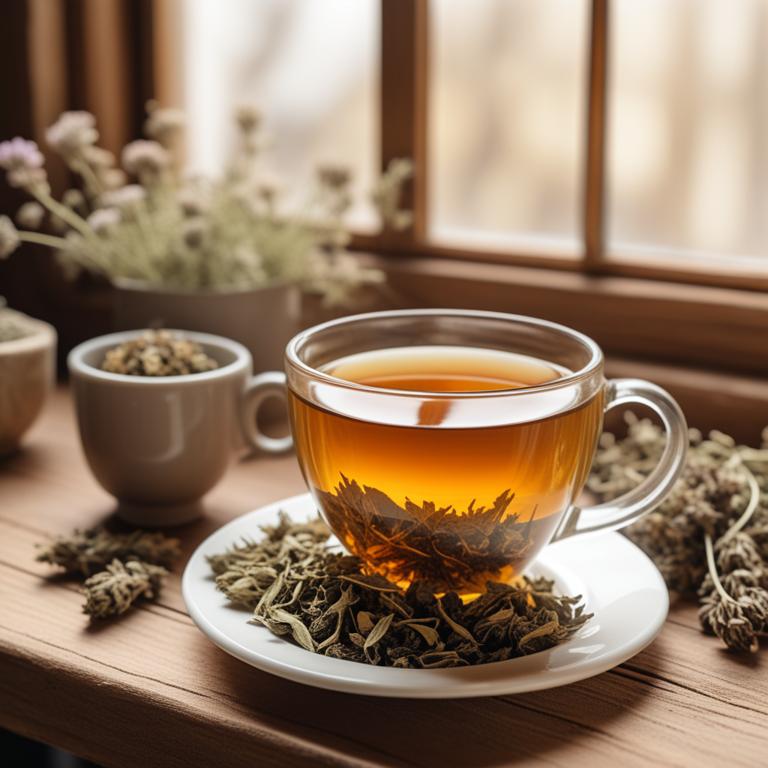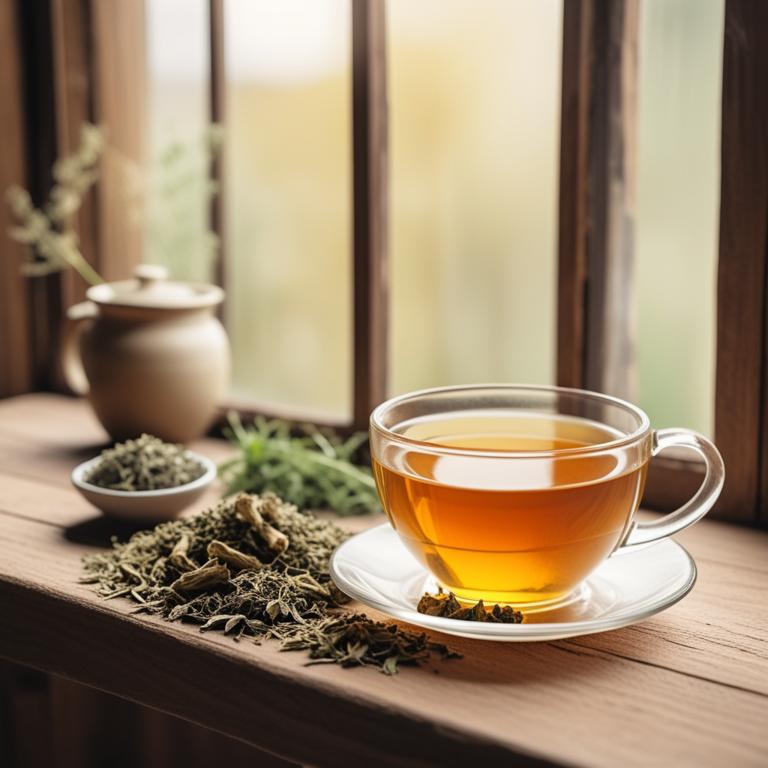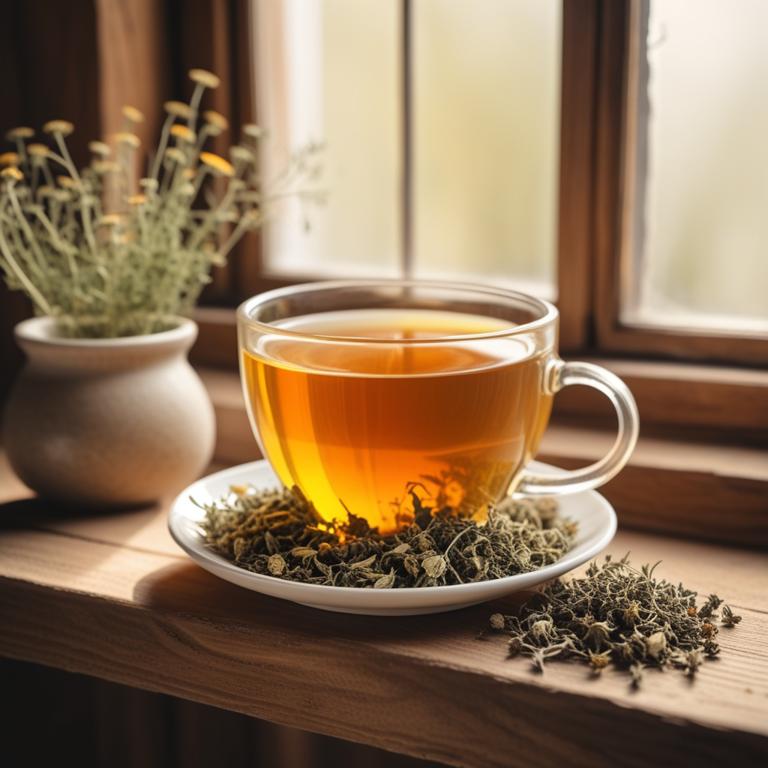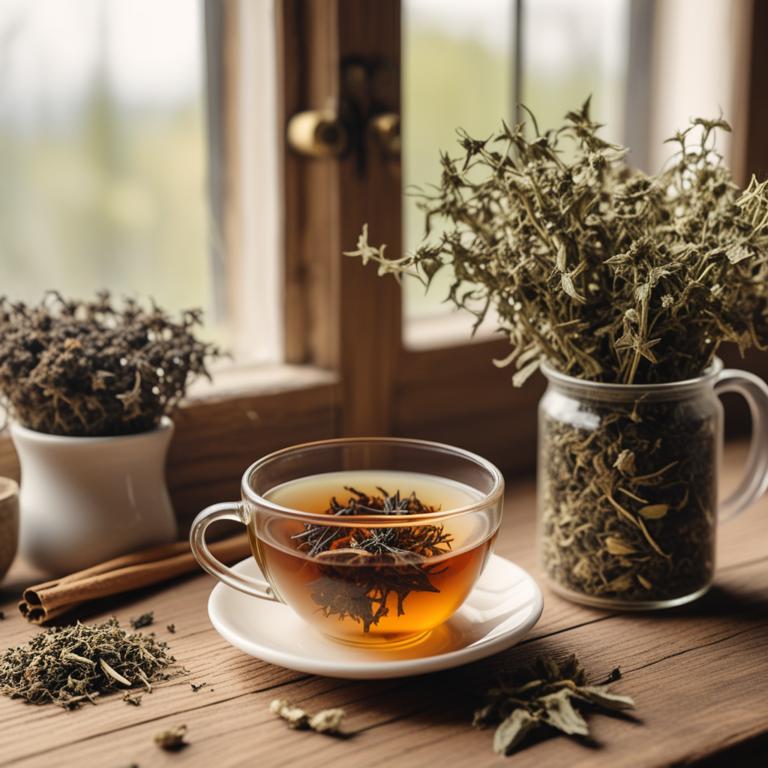9 Best Herbal Teas For Flatulence

Herbal teas for flatulence are a type of herbal remedy that helps alleviate and reduce the symptoms of gas and bloating in the digestive system.
These teas are known to provide relief and comfort to those experiencing flatulence due to various reasons such as digestive issues, dietary changes, or other health conditions.
Examples of herbal teas that can help treat flatulence include peppermint tea, which helps relax the muscles in the digestive tract and reduce inflammation; ginger tea, which aids in digestion and reduces nausea; chamomile tea, which soothes the stomach and calms the nervous system; fennel tea, which reduces gas and bloating; dandelion tea, which helps stimulate digestion and relieve constipation; and licorice root tea, which soothes the stomach and reduces inflammation.
By incorporating these herbal teas into one's daily routine, individuals can experience a natural and effective way to manage and alleviate the symptoms of flatulence.
According to "Journal of ethnopharmacology", teas for flatulence may be beneficial, as some medicinal teas used in Southern Xinjiang, China contain species such as Piper longum L., Curcuma longa L, and Senna alexandrina Mill. which are known to aid in digestion and possibly alleviate flatulence, though high doses of these species may have negative health implications.
Below there's a list of the 9 best herbal teas for flatulence.
- 1. Foeniculum vulgare teas
- 2. Zingiber officinale teas
- 3. Rosmarinus officinalis teas
- 4. Cuminum cyminum teas
- 5. Peumus boldus teas
- 6. Curcuma longa teas
- 7. Cinnamomum zeylanicum teas
- 8. Piper nigrum teas
- 9. Cinnamomum cassia teas
Also you may be interested in...
TODAY'S FREE BOUNDLE
Herb Drying Checklist + Herbal Tea Shopping List + Medicinal Herbs Flashcards
Enter you best email address below to receive this bundle (3 product valued $19.95) for FREE + exclusive access to The Aphotecary Letter.
$19.95 -> $0.00
1. Foeniculum vulgare teas

Foeniculum vulgare teas, also known as fennel teas, have been traditionally used to treat flatulence due to their carminative and anti-spasmodic properties.
The active compounds present in fennel teas, including anethole, limonene, and fenchone, help to relax the muscles in the digestive tract and reduce gas production, thereby alleviating flatulence.
The bioactive constituents of fennel teas, such as flavonoids and phenolic acids, also exhibit anti-inflammatory and antioxidant properties, which contribute to their therapeutic effects in treating flatulence.
Regular consumption of fennel teas has been shown to provide relief from flatulence and associated symptoms, making it a popular natural remedy for digestive issues.
Related Study
According to the provided scientific STUDY, Foeniculum vulgare teas for flatulence contain biologically active chemical constituents that possess significant spasmolytic effects, making them a potentially safe and cost-effective alternative for treating gastrointestinal issues.
2. Zingiber officinale teas

Zingiber officinale teas, also known as ginger tea, have been traditionally used to treat flatulence due to their anti-inflammatory and carminative properties.
The bioactive constituents responsible for this effect include gingerols and shogaols, which help to relax the muscles in the digestive tract and reduce gas production.
By consuming ginger tea, individuals can experience relief from bloating, discomfort, and gas, ultimately alleviating the symptoms of flatulence.
Regular consumption of ginger tea has also been shown to have additional benefits, such as reducing nausea and promoting digestive health.
Related Study
According to the given study, Zingiber officinale teas for flatulence may be effective in modulating GI motility and improving symptoms of functional dyspepsia.
3. Rosmarinus officinalis teas

Rosmarinus officinalis teas have been traditionally used to treat flatulence, a condition characterized by excessive gas production and bloating in the digestive system.
The anti-inflammatory and carminative properties of this herbal preparation help to treat flatulence by reducing inflammation in the digestive tract and preventing the formation of gas.
The bioactive constituents, including rosmarinic acid, borneol, and camphor, found in Rosmarinus officinalis teas, contribute to their carminative and anti-inflammatory effects, which help to alleviate symptoms of flatulence.
The benefits of using Rosmarinus officinalis teas to treat flatulence include reduced bloating, improved digestion, and a decrease in the frequency and severity of flatulence episodes.
4. Cuminum cyminum teas

Cuminum cyminum teas, derived from the seeds of the cumin plant, have been traditionally used to alleviate flatulence and related symptoms.
The anti-inflammatory and carminative properties of these teas help to treat flatulence by reducing inflammation in the digestive tract and relieving gas and bloating.
The bioactive constituents, including limonene, cuminaldehyde, and cuminic acid, exhibit carminative and anti-inflammatory effects, which contribute to their therapeutic benefits in treating flatulence.
Regular consumption of Cuminum cyminum teas may help to alleviate symptoms of flatulence, promote digestive comfort, and support overall gut health.
5. Peumus boldus teas

Peumus boldus teas, also known as boldo tea, have been traditionally used to treat flatulence and related digestive issues.
The herbal preparation's properties, including its ability to relax the digestive system and reduce inflammation, help to alleviate symptoms of flatulence.
The bioactive constituents of boldo tea, such as boldine and caffeic acid, exhibit carminative and anti-inflammatory properties, which contribute to its effectiveness in treating flatulence.
By consuming Peumus boldus teas, individuals may experience relief from bloating, discomfort, and other symptoms associated with flatulence, making it a natural and potentially beneficial remedy for this common ailment.
6. Curcuma longa teas

Curcuma longa teas have been used for centuries to treat flatulence, a common ailment characterized by excessive gas and bloating in the digestive system.
The properties of this herbal preparation, including its anti-inflammatory and carminative properties, help to alleviate symptoms by reducing inflammation in the digestive tract and preventing the formation of gas.
The bioactive constituents of Curcuma longa teas, such as curcumin, turmerone, and atlantone, have been shown to possess potent antioxidant and anti-inflammatory activities, which contribute to its therapeutic effects in treating flatulence.
Regular consumption of Curcuma longa teas has been found to provide relief from flatulence, reduce discomfort, and promote overall digestive health, making it a popular natural remedy for this common ailment.
Related Study
According to "Open life sciences", Curcuma longa teas for flatulence may be beneficial due to the presence of curcumin, a compound that constitutes the main active substance within the plant and has potential in preventing or treating digestive diseases.
7. Cinnamomum zeylanicum teas

Cinnamomum zeylanicum teas, also known as Ceylon cinnamon tea, have been traditionally used to treat flatulence due to their carminative and anti-inflammatory properties.
The bioactive constituents of Ceylon cinnamon, including cinnamaldehyde and eugenol, help to reduce inflammation in the digestive tract and alleviate symptoms of flatulence.
By relaxing the muscles in the digestive tract and reducing gas production, Ceylon cinnamon tea helps to treat flatulence and improve overall digestive health.
The benefits of using Ceylon cinnamon tea to treat flatulence include improved digestion, reduced bloating, and a decrease in discomfort associated with passing gas.
8. Piper nigrum teas

Piper nigrum teas, also known as black pepper tea, have been traditionally used to alleviate flatulence and related digestive issues.
The anti-inflammatory and carminative properties of this herbal preparation help to treat flatulence by reducing inflammation in the digestive tract and relieving gas and bloating.
The bioactive constituents of Piper nigrum, including piperine and other alkaloids, have been found to have analgesic, anti-inflammatory, and antioxidant effects that contribute to its ability to treat flatulence.
The benefits of using Piper nigrum teas to treat flatulence include improved digestion, reduced bloating and discomfort, and a decrease in the frequency and severity of flatulence episodes.
9. Cinnamomum cassia teas

Cinnamomum cassia teas have been traditionally used to alleviate flatulence symptoms due to their carminative and anti-inflammatory properties.
The bioactive constituents present in Cinnamomum cassia teas, such as cinnamaldehyde and cinnamic acid, help to treat flatulence by inhibiting the growth of bacteria that produce gas in the gut and reducing inflammation in the digestive tract.
These properties enable Cinnamomum cassia teas to effectively alleviate symptoms of bloating, discomfort, and gas, providing relief from flatulence.
Regular consumption of Cinnamomum cassia teas is beneficial in treating flatulence as it promotes digestive comfort and well-being, making it a popular herbal remedy for gastrointestinal issues.